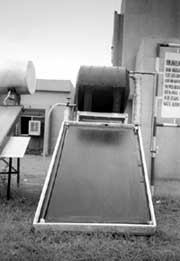A sunny mandate
 geyser manufacturers could soon be out of business in Haryana. As a part of its energy conservation effort, the state government has made the use of solar water heating system (swhs) mandatory in private functional buildings such as hospitals and hotels. A regulation that makes the installation of swhs compulsory in government and public sector undertaking structures is already in place in the region. The authorities are also contemplating the inclusion of private residential houses in the project.
geyser manufacturers could soon be out of business in Haryana. As a part of its energy conservation effort, the state government has made the use of solar water heating system (swhs) mandatory in private functional buildings such as hospitals and hotels. A regulation that makes the installation of swhs compulsory in government and public sector undertaking structures is already in place in the region. The authorities are also contemplating the inclusion of private residential houses in the project.
Responding to the directive of the state government, the Haryana Urban Development Authority (huda) has stipulated that swhs be made mandatory in all residential and institutional buildings having an area of 836.12 square metres or above.
B S Yadav, project director of department of non-conventional energy sources (nces), Haryana, says that setting up the swhs is an uncomplicated process as the equipment required is very basic in nature. Moreover, the maintenance cost is negligible. The system comprises a collector that traps the sun's heat energy, a cold water tank, a hot water tank and pipes. Solar energy heats the collector surface and this heat is transferred to water, which flows through tubes attached to the collector. Other requirements are merely a shadow-free roof and a three-square-metre area. "According to a study conducted by the state nces department, a lot of energy could be saved if a 100 load per day swhs
